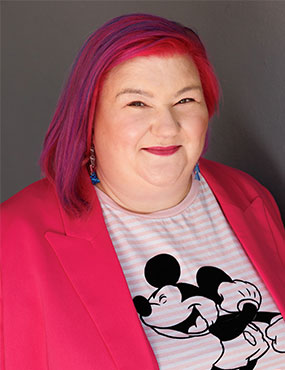My experience at the Parliamentary Library taught me that I am best placed inside the academy rather than trying to work in the public service – but I never would have found that out if I hadn’t done the Summer Scholar program, and for that I am grateful.

Short bio:
K B Heylen (they/them) is a PhD candidate in the Department of Media, Communications, Creative Arts, Language and Literature. They have a Master of Research from Macquarie University and a Master of Commerce from Charles Sturt University.
Before returning to study in their late 30s, Heylen had a varied career spanning arts management, economic development, and communications. Heylen is also a fat positivity activist and burlesque performer and has a second research stream working at the intersection of fat studies, queer theory, and performance studies.
Tell us about your PhD research topic in 100 words or less:
My PhD is on the buy-now-pay-later app Afterpay. Afterpay has traditionally been studied from a business discipline, but I am bringing a media studies lens to the app to see what new findings I can uncover by switching the paradigm.
In practice, this means examining Afterpay’s data practices, algorithms, user interface, audience perception, terms of agreement and privacy policy – the way one might study Instagram or Netflix, for example. I hope that by bringing a media lens to a non-media technology I might create new understandings that help contribute to greater consumer awareness and better regulation.
What motivated you to do a graduate research internship with the Parliamentary Library?
The Parliamentary Library Summer Scholar program was a great opportunity to look more closely at the regulation surrounding Afterpay and financial technology (fintech) more broadly. I’ve always been interested in technology regulation, and the Summer Scholar program gave me the space, time and resources to focus more closely than I had before. I’m also a giant politics nerd and was super excited for the opportunity to work inside Parliament House and live in Canberra for six weeks.
Please tell us a bit about your internship project, and what you produced during the internship (ie reports, presentations, etc):
My project examined how the term ‘fintech’ was debated and defined inside Parliament. I examined Hansard records, Senate inquiries and public submissions to understand how language choice influences the development of regulation for the fintech sector. I produced a 6,000-word research paper as a result of the program, which will be published on the Parliamentary Library website later this year. The report will be available not only to politicians and library researchers but to the public as well.
Were there any challenges you faced during your internship, and how did you approach them?
A key challenge was the requirement for my research to be impartial. The Parliamentary Library provides impartial and confidential research to politicians across the political spectrum, so the advice has to be politically neutral for good reason.
My report is neutral as required, but I have realised that’s not my preferred style of writing and research – I am a tech critic, and I want to conduct critical research. My experience at the Parliamentary Library taught me that I am best placed inside the academy rather than trying to work in the public service – but I never would have found that out if I hadn’t done the Summer Scholar program, and for that I am grateful.
How has the internship had an impact on you as a researcher? Has it changed your approach to any aspects of your PhD research?
The Summer Scholar program reinforced my interest in technology policy and showed me how researchers can input into policy and regulation formation through the Senate Inquiry process. It showed me how important it is to do work that critiques systems others take for granted so that lawmakers can hear a range of perspectives.
Learn more about the Parliamentary Library Summer Scholar program.